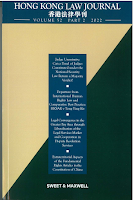2020, Volume 2
MILITANT DEMOCRACY AND CONSTITUTIONALISM
The Government and Laws Committee, The University of Hong Kong (GLC) is pleased to officially unveil the Second Volume (2020) of the Hong Kong Journal of Law and Public Affairs (HKJLPA), the official annual journal of the GLC. The volume is titled “Militant Democracy and Constitutionalism”.
ABOUT THE VOLUME
The Second Volume 2020 of the Hong Kong Journal of Law and Public Affairs, published in Fall 2020, is entitled “Militant Democracy and Constitutionalism”.
The end of Cold War has once endowed the world with optimism that the End of History has finally arrived. However, the rise of populist leaders with little regard to democratic norms, authoritarians which harness the constitutional toolbox to subvert democratic processes and an unprecedented invocation of emergency powers to combat the COVID-19 pandemic have all but blossomed into a siege against Constitutional Democracies on a global scale. This timely Volume, situated against the backdrop of global constitutional backsliding, features essays from leading political scientists and constitutional scholars. It discusses one of the possible countermeasures of democratic self-defence that has existed since 1937 – militant democracy and militant constitutionalism.
In addition, this Second Volume is graced with a case commentary on Miller (No.2), two interviews with leading constitutional lawyers Professor Andrew J Harding and Dr Tonio Borg, and two author interviews conducted with Professor Joel Colón-Ríos and Dr Eric C Ip on their new books. It ends, as usual, with a review of the Government and Laws Committee's initiatives and publications over the past academic year.
OBTAINING A COPY
ABOUT HKJLPA
The Hong Kong Journal of Law and Public Affairs (HKJLPA) is the first English language studentedited journal in law and political science in East Asia, published by the Government and Laws Committee, The University of Hong Kong (GLC) since 2019, in restoration of the student-edited Hong Kong University Law Journal (1926-1927), founded by Professor George Keeton (1902-1989), the first Lecturer of Political Science and Jurisprudence and Reader of Law and Politics at HKU, and later Dean of Laws and Vice Provost at University College London (UCL).
Supported by an International Editorial Advisory Board consisting of distinguished scholars, HKJLPA publishes articles in the English language from researchers, teachers, practitioners, and students all over the world. It accepts submissions in all areas broadly related to the intersection between law and politics, including but not limited to comparative constitutional law and politics, international law and relations, jurisprudence and political philosophy, and administrative law and public administration.
As the GLC’s flagship publication backed by the HKU Government and Laws Programme, HKJLPA is committed to promoting a stronger understanding of cutting-edge issues that lie at the nexus of law and politics at the international and domestic levels, and to offering a robust platform for the exploration of ideas that will guide how societies are organised and governed.




